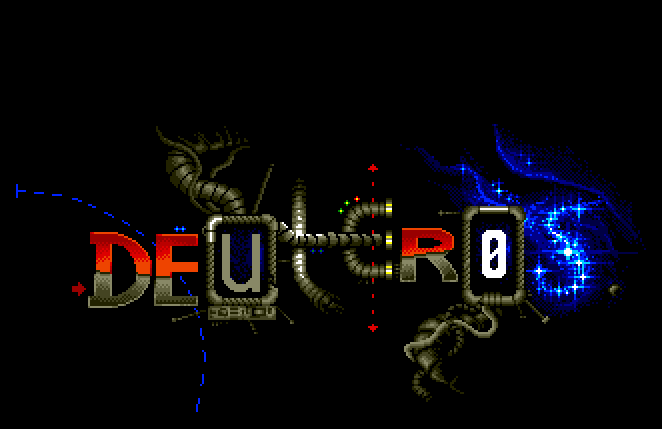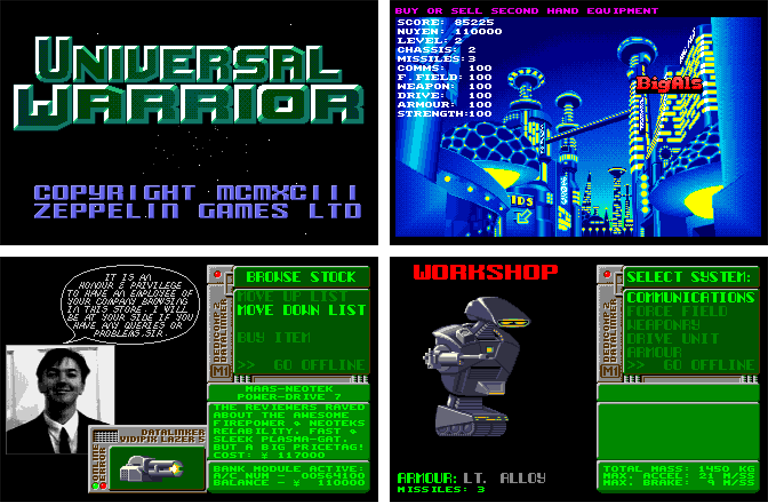A lasting impression
While gaming in my 2025 has been a parade of the usual suspects (farming in Stardew Valley, salvaging in Shipbreaker, scouring the Koronus Expanse as Rogue Trader the fourth and still bumming around Night City); my brother (the esteemed Professor Tanuki) went his own route (as he is wont to do) by discovering an easier alternative to emulating the Amiga 500 (called FS-UAE) and promptly firing up Deuteros – the 1991 sequel to Millenium 2.2 and all-around Odd-Duck Strategy Gem.
Watching him enjoy playing this 34-year-old game, it occurred to me that unlike modern titles – which "borrow" popular mechanics from one another, overly concern themselves with current trends and seldom take risks with Brand New Ideas – Deuteros was and remains truly unique. Plenty of sci-fi strategy games have been made since 1991: not a single one was like Deuteros.
And I think modding is to blame.

As is generally the case, I don't have any concrete evidence to support this – it's just porcine guesswork balanced precariously atop years I've lived through a certain slice of gaming history – but it sure sounds plausible... Consider this:
Of the couple thousand games released between 1985 and 1996 (the Amiga 500's heyday), few if any were carbon copies of other titles. Limited as they were by a hard ceiling on technical specs, developers prided themselves on coming up with original ideas and new mechanics for every new release — it was the only way to set their game apart from the competition.
Every new production had a distinct graphical suite running on a unique engine. Every new setting was crafted from the ground up. And most mechanics were made from scratch to suit that particular game. It probably wasn't the most economical way to go about game design and plenty of ideas bombed, but the amount of times you loaded a floppy and thought to yourself "hm, plays exactly like so-and-so" were practically nil.
PC gaming, on the other hand, seemed almost averse to not imitating popular ideas right from the get-go. As an example — from Wolfenstein 3D (1992), through Doom (1993), Quake (1996), Half-Life (1998), Halo (2001), Call of Duty: Modern Warfare (2007) and Destiny (2014); to the latest crop of FPSs, like Overwatch (2016) or Counter Strike 2 (2023), devs have been remaking the same basic idea for 31 years. With different settings and "stories", sure, and slightly different mechanics — but the same, geriatric gameplay and underlying design...
The modding scene, which existed as far back as 1986 (with the Boulder Dash Construction Kit), didn't properly take off until 1993, when teh interwebs let likeminded people collaborate on mods for Doom – mods with official approval from Id Software (so long as they only worked with the retail version of the game). Later, popular mods for Quake (like Team Fortress) were integrated by devs as standard features for FPS games. This set a precedent for game development that loosely said "hey: it's okay to take someone else's idea and integrate it."
This notion of design cross-pollination coupled with the homogenization of development frameworks (like Unity, Unreal Engine, Cry Engine or Blender); and an almost uniform move toward 3D graphics has all but ensured the distinction between one modern game and the next mostly comes down to flavor – with unique design relegated to underperforming yesteryears...

Don't get me wrong – I'm glad modding exists and is as widespread as it is: devs don't have time to think of everything, after all, and it's nice to have an additional resource that lets you set up your game just the way you like it. At the same time, though, I think the trend has made folks too comfortable with tweaking existing ideas rather than coming up with ones of their own.
Following Professor Tanuki's example, I downloaded my own copy of FS-UAE and had a wee trawl through Lemon Amiga to track down some titles I was fond of, back in the day (I'm especially giddy to rediscover Universal Warrior, Starblade and Defender of the Crown). Chances are I won't have time to enjoy them as much as I'd want to, but having the option to do so beats simply reminiscing any day of the week.
Slow going
Pig-musings aside, my 2025's been off to a start so slow, if calendar's weren't a thing I wouldn't have guessed another year's gone by...
My Stardew farm has grown as much as I probably want it to (finally got some piggies! whee!!!); and the Shipbreaker experience has plateaued into a semblance of actual work (I'm level 19 and can work on the largest ships available but – still 908 million in debt!? said largest ships net about 30 million a piece and take a conservative two hours actual time to strip... I like Hardspace: Shipbreaker, but — not sure I like it enough to spend 60 more hours with it).
Cyberpunk and Rogue Trader continue to delight. The latest patches in both seem to have cut down on the amount of rando-crashes during regular gameplay (2077 still conks out once in a blue moon, but Rogue Trader hasn't crashed once since 1.3). Bug fixes aside, Rogue Trader also rebalanced some fights (which is neat); and added a few new items as rewards (which is not retroactive for pre-1.3 playthroughs and thus frustrating). This whole "fixing the game after you've played it" trend gets on my nerves a little.
The pig-radar is clear to the horizon, with the closest intriguing release not due until — April? (not sure what "Spring 2025" means for Lex Imperialis). If nothing new comes along soon – and I wrap up the four games I'm playing – maybe I'll fire up FS-UAE and write a B.A.T. retrospective. Much as I liked the game, I never did actually finish it...
Hope your 2025 is off to a pleasant (or at least minimally frustrating) start. Keep warm, stay safe and – oh, yes – Happy New Year!
Pig — out.
